Peter G. Makaroff — a Doukhobor for all times
The following is an enhanced biographical tribute to P.
G. Makaroff from Spirit
Wrestlers: Doukhobor Pioneers’ Strategies for Living
(2002) by Koozma J. Tarasoff. : pages 296-299. More
information and articles about Makaroff are included here.
In 2020 a Wikipedia page was started about Peter
Makaroff.
In 2007 the university’s Alumni Association
included Makaroff on its 100th year anniversary using the
photo on the right. ('100 Years of Excellence, University
of Saskatchewan', StarPhoenix, Saskatoon SK,
September 14, 2007, page F4.)
In 2006 he was listed in the Cast of characters for the research
project 'Explosion
on the Kettle Valley Line: The Death of Peter Verigin',
which is one of 13 'Great Unsolved Mysteries in Canadian
History'. More at: Q72:
1924 Train Explosion Files Still Secret?
(Spirit-Wrestlers Blog, June 3, 2016).
In 2005 he was profiled during the Saskatchewan Centennial (1905-2005) among 100 "Saskatchewans ... prominent and important ... whom you really should be familiar — but might not be." "Peter Makaroff, Saskatoon; Lawyer, peace activist", 'Happy Birthday Saskatchewan 1905-2005', StarPhoenix (Saskatoon), 3 September 2005, page 98 (G14).
In 2004 he was included in a collection of 44
short biographies: 'Man
of Peace: Peter Makaroff', in Saskatchewan's
Own: People Who Made A Difference, by journalist
Verne Clamence. Clarification are added and errors
corrected.
In 1970 his death was announced in this article
with his photo: "Peter
G. Makaroff dies", StarPhoenix (Saskatoon),
7 December 1970, page 3.
In 1962 he was featured this Sunday magazine
article: 'These
Doukhobors Are Different' (Internet Archive), in Star
Weekly and Canadian Magazine (Toronto), which
you can read as a flip-book at the Internet Archive, and
as a PDF.
In 1934, during the Great Depression, a protest
developed in Vancouver BC by unemployed single Canadian
men in federal relief camps, who united in a Relief Camp
Workers' Union, and began an On-to-Ottawa
Trek. In 1935 the Regina
Riot erupted, and over 140 people were arrested.
Peter Makaroff, a well known "... Doukhobor ... pacifist
and a political radical ..." was asked to represent the
workers with attorney Emmett
Hall. They successfully got all men freed but 9 who
served 18 months each. He confronted and survived immense
prejudice from government, attorneys and the press for
defending the strikers. (Gruending, Dennis. 'Chapter
3: Defending the Trekkers', Emmett Hall:
Establishment Radical, Macmillan of Canada, 1985,
pages 25-32.) (Get free account to read the book.)
In 1926 he was a member of the Saskatoon young
men's 'Eclectic Club'.
In 1924 he was listed in Canadian Publicity
Company. Pioneers
and prominent people of Saskatchewan.
Winnipeg: Canadian Publicity Co, 1924. pages 253-254.
(Text version at Roots.web.com: pages 253-254.)
MAKAROFF: Peter George, B.A., LL.B., barrister (Makaroff & Bates). Born in Russia in 1896, son of Gregory and Praskovia (Postnikova) Makaroff. Married Helen Marshall in 1920, and has one son. Educated at the Friends School, Media, Pa., U.S.; Petrofka Public School, Rosthern Public School, High School, University of Saskatchewan. Father of Mr. Makaroff came to Canada with the Doukhobor colony in 1899; settled near Rosthern; farmed. Mr. Makaroff graduated from the University of Saskatchewan in 1915, with the degree of B.A., and obtained his LL.B. in 1918. Opened the practice of law in Saskatoon. He is the first member of the Doukhobor sect in its history to enter and graduate from any high school or university. Formed present partnership with Mr. Bates in 1919. Won the individual championship in sports at the University, 1914-15. Member of the Saskatchewan Law Society. Member of the Eclectic Club. Religion, a member of the Doukhobor sect. A Liberal.
In 1914 his first job was teacher of Harmonia
School District #2905, near
Blaine Lake.
In 1912 he was on the track
and field team, University of Saskatchewan.
'Working Uphill Against Apparently Impossible Odds'
Peter G. Makaroff (1894-1970) 'was always at his best working uphill against apparently impossible odds', according to Carlyle King, his fellow-pacifist friend and English professor. 'His whole life had been an uphill struggle... '(King, 1983: 104). Born in Kars, Russia, to a Doukhobor family by the name of Gregory Popoff, Peter came to Canada in 1899 on the second of four ships to reach this country and settled on the Canadian prairies. At that time he could speak no English, but in less than 20 years he was to be recognized as one of Canada's outstanding young lawyers. As one who has inspired me and countless others, Peter rightly deserves the title of 'our Bertrand Russell' as well as 'our Socrates'.(1)
At the beginning of the 1900s, the Society of Friends (Quakers) made regular visits to the new Doukhobor colony of Petrofka* [sic: Petrovka, Wikimapia] on the banks of the North Saskatchewan River not far from the present town of Blaine Lake. They spotted a bright boy and helped Peter to get a high school education, first at Philadelphia and later at the Rosthern Academy, fifty miles north of Saskatoon. He was able to get a teaching certificate from a short session at Normal School, and then with the money saved from the meager salary of a schoolteacher, he was able to put himself through the University of Saskatchewan and emerge with a Bachelor of Laws degree in 1918. He was the first student of non-Anglo-Saxon parents to graduate from the University — which means that he was the first Doukhobor to go to college and become a professional man.
In 1916 the ‘Society of Independent Doukhobors’ was formed largely to preserving their exemption status.
….The organization was made necessary when the Government demanded that the Doukhobors sign National Service cards, as an acknowledgement of their exemption status. Naturally, this demand brought some uneasiness. In January 1917, Peter G. Makaroff, a young Doukhobor lawyer, led an Independent delegation of five men to Ottawa. They stated that they were quite willing to sign the cards provided their religious beliefs were respected. As an offset to military service, they offered to pay a double measure of taxation if necessary. Moreover, the delegates pointed out that the Doukhobors in Western Canada had been giving active support to the greater production campaign and had placed as much of their land as possible under crop. Before leaving Ottawa, the Honourable Arthur Meighen explained to the delegation the National Service Act and assured them that ‘no interference with the privileges enjoyed by the Doukhobors was intended’. Upon returning home, the delegates presented a full report at a large one-day conference of Doukhobors in Verigin, Saskatchewan…. (‘No Interference with Doukhobors’, The Citizen (Ottawa), January 15 1917, cited in Tarasoff, K.J. ‘In Search of Brotherhood: History of the Doukhobors,’ 3 volumes, unpublished, 1963, pages 496-497.)Since then, all Doukhobors of conscience remained exempt from military service in Canada, free to perform alternative service or, if absolutist, jail time.
Within a year of completing his practice, he was pleading cases before the Supreme Court of Canada Later, in 1932, Dr J.T.M. Anderson, then Conservative premier of Saskatchewan, appointed Peter Makaroff as King's Counsel in recognition of the important part he played in helping to quell some of the rambunctious antic of the zealots. He acted as counsel to Peter P. Verigin in British Columbia, in the legal battle in which Verigin was saved from last-minute illegal deportation to his native Russia. Because of the high drama of this incident, I attracted much interest in the international press (McConnell, 1992: 95). Peter Makaroff continued to defend Peter V. Verigin throughout the years. He remained as legal council for the leader when the United State Commission Agents (in 1937) brought a $1,000,000 suit against the Community Doukhobors.
At this point, the noted celebrated judge Emmett M. Hall was asked to come down from Saskatoon to help a noted radical lawyer' Peter G. Makaroff with the defense, and he accepted gladly. 'It was obvious,' he said 'that this was a police riot. Until the police charge there wasn't the slightest evidence of wrongdoing or intended wrongdoing on the part of the strikers. Instead of doing anything about the unemployed, the government slapped them into camps, and when they boiled over a confrontation was provoked.'(2) The trials lasted well into 1936. Five accused were acquitted, 12 cases were dropped for lack of evidence and nine men were convicted and received sentences of up to 18 months, many of whom welcomed the prospect of regular meals and accommodation which they could not receive outside because of non-existent jobs. The Hall-Makaroff team helped the 'small guys' get a fair shake in our courts. They were made the victims of conditions that existed in Canada through no fault of their own.
Peter was the first non-Anglo Saxon to serve on the University of Saskatchewan Board of Governors, even though he was strenuously opposed by the Imperial Order of Daughters of the Empire by a resolution which sharply criticized him as being widely known throughout Saskatchewan for extreme pacifist views and for opposition to Canada's active participation in the war' (McConnell, 1992: 99). By the early 1960s there were 200 Doukhobors registered at the University of Saskatchewan, the biggest representation of any non-Anglo-Saxon group' (Locke, 1962: 5).
Another of Makaroff's appointments was as chairman for the Saskatchewan Labour Relations Board for more than one decade up to 1964 in which capacity he served as counsel for employees claiming to have been wrongfully dismissed. In the celebrated John East case, it was established that the provincially appointed Board was not usurping the functions of the superior court and was validly constituted.
I have known Peter as a man who lived strenuously, with gusto and gusto and good humour. He had tremendous energy and tenacity. He held firm convictions but his loyalty to friends and family members never faltered when they failed to live up to his high expectations. Most of his free time was devoted to political action in support of humanitarian goals. Fellow lawyers saw him as not only a lawyer with great ability, especially as a master in cross-examination, but as one who was concerned about upholding the fundamental principles of human justice
He was fortunate to have shared in the successful fights to achieve important social advances such as universal hospitalization and Medicare insurance. He was one of the original CCF group (Co-operative Commonwealth Federation) with his revered friend, the late J. S. Woodsworth, its first leader, who was like himself, committed to democratic socialism and pacifism.
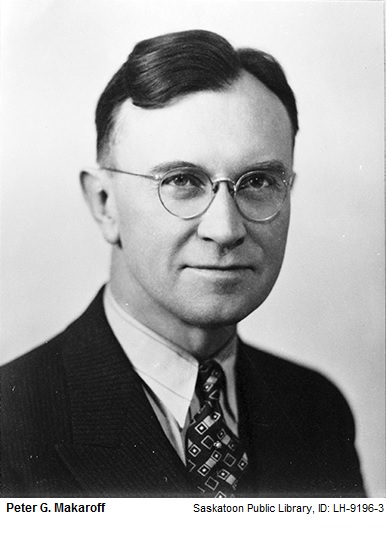 |
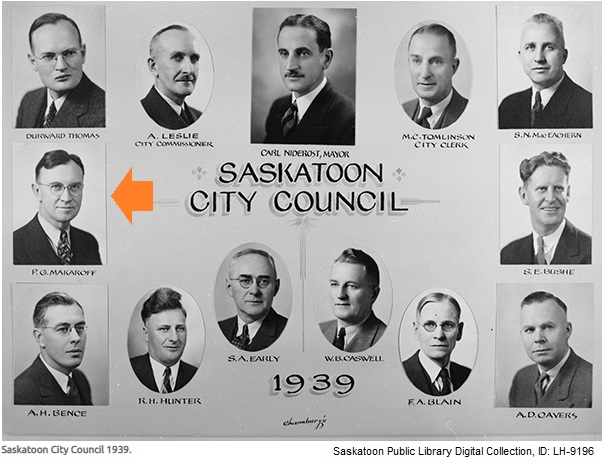 |
Peter served one term on the Saskatoon City Council, 1939-1940. This was the time when he literally turned the other check after being hit by a fellow Alderman because Peter dared to speak out against the institution of war at the beginning of World War II.
Venturing into the political arena was for him a conviction that he might be able to change people's opinion about the war and peace. He was a member of the Progressive party that existed in Saskatchewan in the 1920s, and had been a member the Farmer-Labor party that later became known as the CCF. He ran federally in 1940 for the Rosthern constituency and had the incumbent Liberal Walter Tucker on the run. But he was never successful in these elections. Ironically, while Peter Makaroff exercised his vote, his brothers and sisters in British Columbia were deprived of their right to vote because of their refusal to do military service. Peter's son. Bob, was kept out of medical college for a year because the chairman of the selective service board, a judge who disliked his fathers politics as well as his Tolstoyan philosophy, ruled that the boy should be sent to a work camp instead. Bob could have claimed automatic exemption as a Doukhobor. Instead he chose to oppose the insanity of war by personal conscientious objection, and was willing to serve in a non-combatant role on completion of his medical training.
Throughout the 1950s, Peter Makaroff continued his extensive law practice in Saskatoon at the time when the zealots in British Columbia were protesting against various government measures. At one of these demonstrations in 1962, Independent Liberal Senator Donald Cameron suggested that the 'Sons of Freedom Doukhobors' be placed on a reservation on one of the Queen Charlotte Islands and provided with vocational and agricultural training 'to rescue them from maladjustment'. Makaroff objected to the description of the Sons of Freedom as Doukhobors saying 'they have nothing to do with the Doukhobor faith' (McConnell, 1992: 99). However, he expressed interest in the proposal that they be sent to some self-supporting community to live decently such as in the Peace River Region (since the Senator's appointment was from Alberta).
Until his death in 1970, Peter Makaroff was true to his Doukhobor principles and concentrated on promoting the idea of establishing world peace through World Government. He came to believe that without a sound structure of humane enforceable international law, mankind could never hope to avoid a nuclear holocaust. He was a long-time member of the Fellowship of Reconciliation and the Saskatoon chapter often met in his law office. He served as chairman of the Saskatoon branch of the World Federalist Movement, and before his death he established the World Federalist Prize to finance a yearly award of $500 for the best essay relating to world peace through world law.(3)
'I am a cynic, a pessimist and an optimist all in one. I'm a kind of schizophrenic, too, just like the rest of society.
'During the past two days I have patiently listened to the discussion on trade relations. Such discussion makes me indignant and impatient....You should throw out all your precedents, and your law books for they lead to naught. Instead you should set up new approaches of international law for none exists today.
'If you will permit, I would like to quote a recent release by the Prime Minister of Canada, Lester B. Pearson. He said that when people have no trust in government and politicians they must rise up and speak up.'(4)
Peter Makaroff certainly 'rocked the boat' to the point that John Holms, President of the Canadian Institute of International Affairs, was 'boiling mad' and criticized Peter for condemning governments with doing nothing. But before the session came to a close, a distinguished Dean of Law from Eastern Canada complimented Mr Makaroff for making such a courageous statement, and said: 'I believe that we all share his deep concern for humanity...It is from ideas like his that progress takes place.’
Successful as he was as a Canadian lawyer and public figure, Peter cherished his ties with Russian culture and the best aspects of the Doukhobor heritage, which for him meant a Tolstoyan Quaker-like day-to-day men behaviour and the rejection of violence and militarism. He was fully bilingual in Russian and English and periodically found time to attend sobranie [religious, prayer] gatherings as well as visit his countrymen and women. He visited the Soviet Union twice and was able to find some of his people.
Peter played a vital role in promoting and helping to organize several peace projects in Western Canada. His motivation was to 'awaken mankind to the dangers of war'. On the 5th of July 1964 he joined the late A.J. Muste and other peacemakers in protesting chemical, biological, and radiological warfare tests at the Suffield, Alberta Defence Research Board station. In November 1964 he met with 400 peacemakers at the gates of the Radar Base, Orcadia, Saskatchewan in a firm resolve to strive for non-violent action, for one world, and for peace and universal brotherhood. On the 27th of June 1965 he joined Mulford Q. Sibley, Frank H. Epp and 1500 people in a rain-soaked peace vigil near the RCAF radar base at Dana, Saskatchewan, where he presented a statement to the commanding officer to take immediate steps towards the prevention of universal suicide. Then on the 5th of September 1966, Peter spoke at the International Meeting for Peace held at the Peace Gardens on the Manitoba-North Dakota border, along with A.J. Muste and other peacemakers. When in August 1970 he came to Ottawa with his wife Helen to the 14th World Congress of the World Association of World Federalists, I was impressed by his good humour, his directness, and his sense of urgency. He was the man of the hour like Bertrand Russell, Martin Luther King, Mahatma Gandhi and Lev Tolstoy were before. All have blazed the trail for others to work for the survival and enrichment of humanity.
|
Makaroff's Words of
Wisdom
Peter G. Makaroff was a model to many Doukhobors as an educated, courageous and intelligent professional who was willing to help the underdog locally, nationally, and internationally. Here are some of his views he wrote to Peter P. Legebokoff, the then editor of Iskra publication, 7th May 1963:
'It
is not enough for champions of the cause of
peace as Doukhobors profess to be, to simply
boast about the burning of arms by their
ancestors in Russia in token of their opposition
to war. In this atomic age such action would
have little or no meaning. I firmly believe that
destiny itself brought the Doukhobors out of
Russia to this English speaking world that they
might play a truly significant role in bringing
about better understanding between the East and
the West in this critical hour of man's history
and thereby help avert the thermonuclear
holocaust that threatens all life on earth.
'To discharge this role it is essential that they put their own house in order and recapture the respect enjoyed by their forefathers as undaunted champions of international peace and ardent advocates of the universal brotherhood of man. To that end they must reconcile their differences and through learning, training and self-discipline prove themselves worthy and deserving of the co-operation of other organizations and men of good will....' * * *
On the third anniversary of The Inquirer,
vol. 5, Nos. 1 & 2, (February-March
1958:10.) Peter G. Makaroff wrote about the
mission of the Doukhobors. He quoted an excerpt
from a recent letter he received from a prominent
Quaker friend:
'We feel that the Doukhobors, as well as
Quakers, must learn to pull together and look
forward, not backward too much....I have a
feeling that our heritage is not something that
can be handed down bodily, as an heirloom, but
must be reborn in each generation, in each
individual, and requires effort, study, and a
conscious rejuvenation to make it fit the
conditions under which we live. There is too
much drifting and reliance on the past and the
good name of our fathers....! do not feel that a
negative peace approach is adequate for our
time. We must not only maintain a testimony
"against" war, but we need to seek practical
ways to ensure peace....'
|
References
- Koozma J. Tarasoff tape recorded interviews No. 161 (April 2, 1961) and No. 15 (Sept. 10, 1965), . Transcripts of same.
- Walter Stewart, 'The Good Works of Emmett Hall', in Maclean's July 1975: 36.
- The winning essays are selected by a panel consisting of: The President, World Federalists of Canada, the Dean of Arts and Science at the University of Saskatchewan, Saskatoon, and the Dean of Law at the same university.
- Notes by Koozma J. Tarasoff at the Banff Conference of Law and Order in the International Community, June 7-8, 1965.
- Peter G. Makaroff, K.C. 1894-1970 (at Archive.org), History of Robertson Stromberg Pedersen LLP. RSLaw.com. — '...a distinguished civil libertarian best known for his representation of labour and minorities during the Great Depression.'
- None of Peter's own family learned the Russian language, to Peter's disappointment. His wife Helen was born in Ontario in 1898 where her father John Marshall was an English professor at Queens University; but due to conflicts in the Department, the family moved to Weyburn, Sask. Helen met Peter Makaroff at the University of Saskatchewan in Saskatoon where she studied for a year, and they married in 1920. Their two children, Robert (Bob), born in 1921, and a daughter Barbara, born in 1923, both became successful medical doctors. Now retired in Vancouver, Bob had this to say about his Dad in a letter to me in 28th March 1999: 'I consider myself so fortunate to have had my father's gift of the universalist ideas in the Doukhobor culture. And his gift of the rich Russian literary legacy, though I never learned the language, and now very much regret it. This always made me feel uncomfortable with my relatives whose English was poor or non-existent. And it has been one more reason for not going to the Doukhobor events which have taken place in the past...I respect the personal value and meaning such celebrations have for other people. But I would only be an awkward intruder.'
Other Publications about P.
G. Makaroff
- 'Verigin Called Tempestuous Mystic By Lawyer Who Stopped Deportation', Star-Phoenix, Saskatoon, SK, 20, April 1935, page 3. — Photo captions: 'Peter Makaroff, legal counsel to Peter [P.] Veregin [sic.: Verigin] (right), Doukhobor leader, and the man who blocked the attempt to deport Veregin [sic.: Verigin]. Lower, a Doukhobor woman in her native costume spinning in her home.'
- On June 3, 1939, King George VI and Queen
Elizabeth made a two-hour stop in Saskatoon as part of
the first visit to Canada by a reigning British emporer.
For a second, 2
Doukhobor women appear on film.
https://youtu.be/C2zQ_kFaLn8 'The 1939 Royal Visit to
Saskatoon' (video, 12:17 min), by Glen C. Larson,
May 18, 2018, minute 11:32.
- Locke, Jeannine. 'These
Doukhobors Are Different', Star
Weekly and Canadian Weekly Magazine
(Toronto), 6th October 1962, pages 1-5. — 7
photos by Kryn Taconis. "A new generation, born,
educated here, is entirely and happily assimilated."
- Peter
G. Makaroff dies, StarPhoenix (Saskatoon),
7 December 1970, page 3.
- King, Carlyle. 'A Beginning in Politics: Saskatoon CCF 1938-1943', Saskatchewan History (Toronto), vol. 36, No.3, Autumn, 1983: pages 102-114. — Undefined, CCF is the Co-operative Commonwealth Federation. Error on page 104 — 3 bonfires were made during the 1895 burning of arms.
- Gruending, Dennis. Emmett Hall: Establishment Radical,
Macmillan of Canada, 1985. 2007 — In this
biography of attorney and Canadian Supreme Court
Judge Emmett
Mathew Hall (1898-1995)
- McConnell, William H. Peter G. Makaroff, QC, Canada's First Doukhobor Lawyer, Saskatchewan History. Vol. 44, 1992, No. 3. — Reproduced with 7 images on the Doukhobor Heritage website.
- Tarasoff, Koozma J. 'Doukhobors' (at Archive.org), in Magocsi, Paul R. (ed.), Encyclopedia of Canada's Peoples, 1999, page 431. — 'In 1915 Peter G. Makaroff became the first individual of Slavic origin to enroll in a Canadian university and graduate. After earning a degree in law three years later, he became a distinguished lawyer and an avid proponent of the pacifist cause.'
- Clemence, Verne. 'Man of Peace: Peter Makaroff', Saskatchewan's Own: People Who Made A Difference, FriesenPress, Manitoba, Canada, 2004, pages 57-61. — Short biography of Makaroff corrected and enhanced. See promotional article below #7 published 2 years later.
- Florence, Bob and Pamela Cowan. "Peter Makaroff, Saskatoon; Lawyer, peace activist", 'Happy Birthday Saskatchewan 1905-2005', StarPhoenix, 3 September 2005, page 98 (G14) -- Among "profiles of 100 Saskatchewans ... prominent and important ... whom you really should be familiar — but might not be."
- Peter
Makaroff: Lawyer, peace activist, Star-Phoenix,
Saskatoon, May 26, 2006, page 78. — Promotion
for new book (#6 above) by Verne Clemence: Saskatchewan's
Own: People Who Made a Difference.
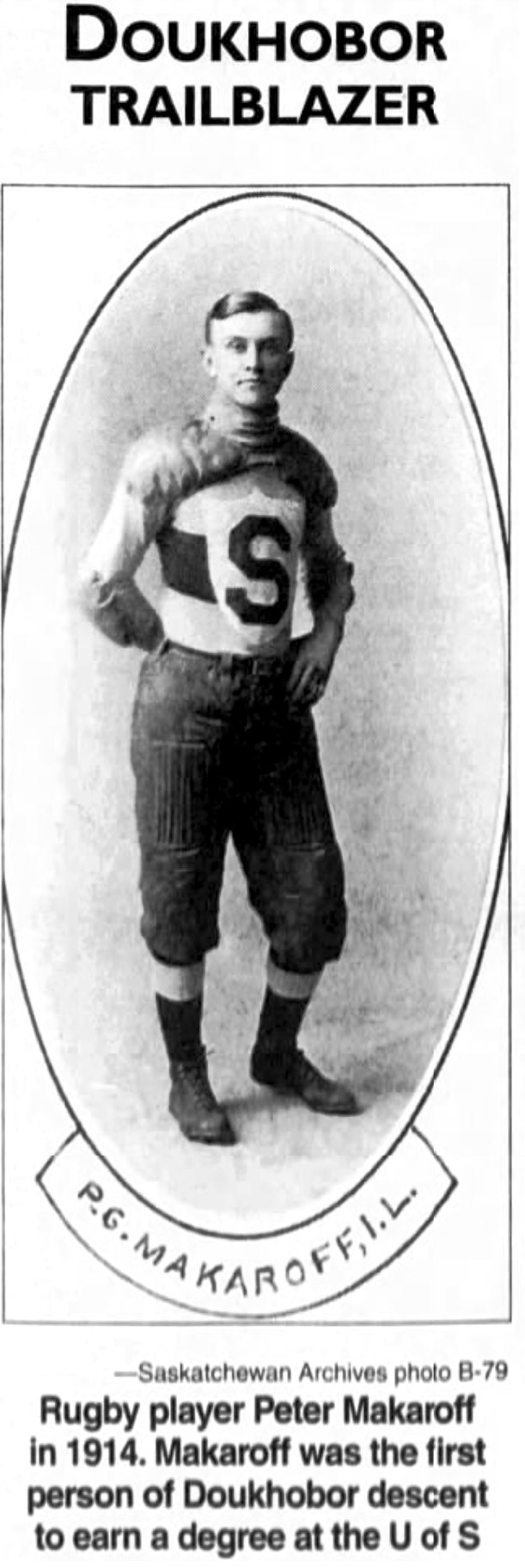
Photo: 'Peter Makaroff in the University of Saskatchewan football uniform', Item S-B6510, Saskatchewan Provincial Archives.
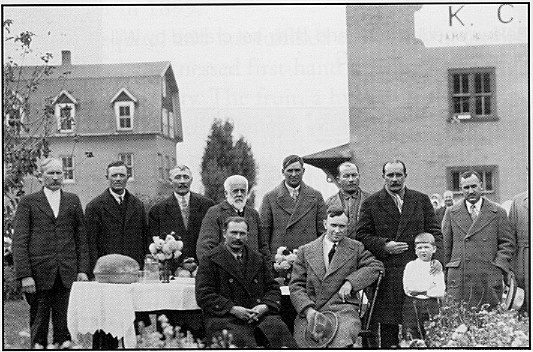
Reception for Peter P. Verigin’s arrival at the KC Enterprise in Brilliant, BC, on 11 October 1927. A younger Peter Makaroff holds his hat in the front row.
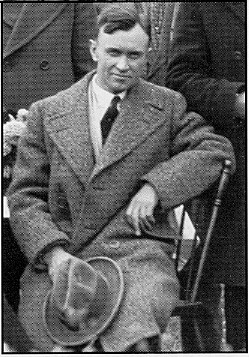
Close-up from above group photo.
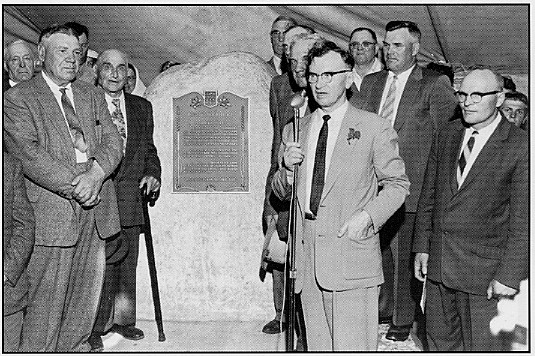
Peter G. Makaroff speaks at the dedication of a plaque by the Saskatchewan Government to the Saskatchewan Doukhobors in June 1959.
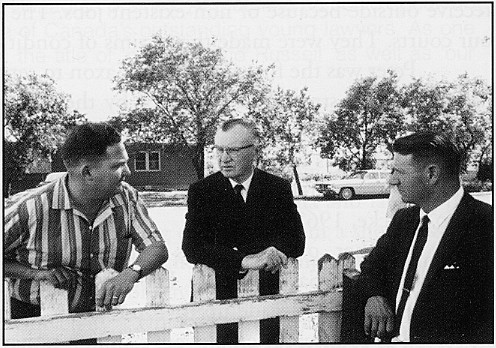
Lawyer Peter G. Makaroff of Saskatoon (centre) converses with the head of the 'Christian' group (left), while farmer Sam A. Cheveldayoff looks on. Photo taken at the Doukhobor Community Home in Blaine Lake, Saskatchewan, August 1966.
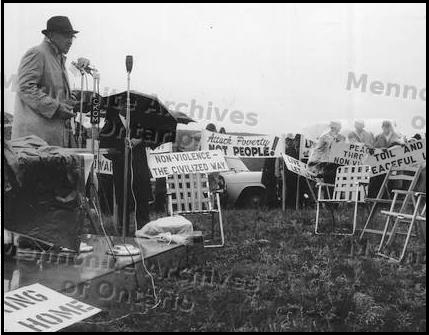
'Peter G. Makaroff speaks at microphone amid signs placed on lawn chairs at the "Manifestation for Peace" at the RCAF Radar Base at Dana [map] near Saskatoon. ... by Frank H. Epp, CM editor." 1967. (Mennonite Archives of Ontario)
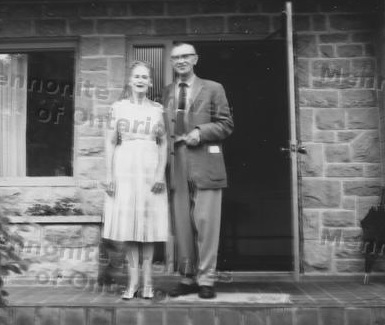
Chairman Peter G. Makaroff and wife Helen, Doukhobors, on the steps of their home in Saskatoon, SK. 1967. (Mennonite Archives of Ontario)
| Colleagues Remember
Peter ‘Former Makaroff partner, now Saskatchewan Court of Queen's Bench justice Paul Hrabinsky, attributes Peter Makaroff's success to his industry and dedication. As an example, he recalls an automobile accident where a husband and wife were seriously injured. Peter retained the services of a pilot to fly him over the area where the accident occurred so they could take photographs of the terrain. ‘Mr Justice Nicholas Sherstobitoff recalls Peter's sheer force of personality. He recalls along with Roger Carter an incident when Makaroff, who "had a voice of rolling thunder", began singing to a jury in Russian. ‘Roger Carter had this to say about Peter: "He was just a delight. Best sense of humour. The most courteous person Just...one of the great people that I have met. Excellent lawyer. We enjoyed practice together very much. In all kinds of ways; personality, and other ways, Peter was the best".'(5) |
Obituary: Makaroff Peter G, Saskatoon StarPhoenix, December 7, 1970, p. 26.
| MAKAROFF
PETER G. — Makaroff. Q.C., 902 Saskatchewan
Crescent, East died at home December 5, 1970, age
76. A Doukhobor, he was born in Russia, came to
Canada at the turn of the century. As a boy, he
lived for a short time with Quakers in the Untied
States, but the remainder of his education was
completed in Saskatchewan. He was the first
Doukhobor University graduate (Law 1918) and
practiced in Saskatoon until shortly before his
death. He lived strenuously, with gusto and good
humor. He had tremendous energy and tenacity. He
held firm convictions but his loyalty to friends
and family members never faltered when they failed
to live up to his high expectations. Most of his
free time was devoted to political action in
support of humanitarian goals. He was fortunate to
have shared in the successful fights to achieve
important social advances such as universal
hospitalization and medicare insurance. He was one
of the original C.C.F. group and he revered his
friend, the late J.
S. Woodsworth. its first leader, who was,
like himself, committed to democratic socialism
and pacifism. In recent years he concentrated on
promoting the idea of establishing world peace
through World Government. He came to believe that
without a sound structure of humane enforceable
international law, mankind could never hope to
avoid a nuclear holocaust. Successful as he was as
a Canadian lawyer and public figure, he cherished
his ties with Russian culture and the best aspects
of the Doukhobor heritage, which for him meant a
Tolstoyan Quaker-like religion and the rejection
of violence and militarism. Of his immediate
family, he is survived by his widow Mrs. Helen
Makaroff (nee Marshall) of Saskatoon; a daughter.
Dr Barbara Hayden of California, and a son, Dr.
Robert Makaroff of Vancouver, and eight
grandchildren; also three sisters and one brother.
A fortunate few will remember him as a man who was
in spirit as much a father to them as their own
natural parent, and he had a host of close friends
and admirers. The family is honoring his very firm
requests for cremation, and that no memorial
service be held. He wished no one to feel any
obligation to mark his passing but suggested that
donations to the Canadian Cancer Society, 305
Central Chambers would be preferable to flowers.
Mr. Makaroff established a fund called "The World
Federalist Prize" (not bearing his name) to
finance a yearly award for the best essay relating
to world peace through world law. Donations to
enlarge this fund may be sent to Mr. Roger Carter,
Dean of Law, U. of S., Saskatoon by people who
share Mr. Makaroffs views in this field. |